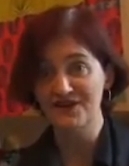 |
Born in Dublin, Ireland, in October
1969,Emma Donoghue is the youngest of eight children of Frances and
Denis Donoghue (the literary critic, Henry James Professor at New York
University). She attended Catholic convent schools in Dublin. In 1990
she earned a first-class honours BA in English and French from
University College Dublin, moved to England, and in 1997 received her
PhD (on the concept of friendship between men and women in
eighteenth-century English fiction) from the University of Cambridge.
From the age of 23, She earned her living as a writer. After years of
commuting between England, Ireland, and Canada, in 1998 Emma Donoghue
settled in London, Ontario, where she currently lives with my partner
Chris Roulston and son Finn and daughter Una.
Here is a review of Emma Donoghue's most
recent and seventh novel titled "ROOM", the story of a 5 year old boy
named Jack who is also the narrator who lived in a room measuring eleven
by eleven feet.
More about Emma Donoghue and her book ROOM.
|
|
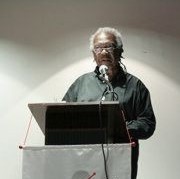 Austin
Clarke was born in St. James, Barbados in 1934. He moved to Canada
in 1955 where he attended the University of Toronto. He worked as
a journalist and broadcaster for CBC, and prior to that, as a reporter
for the communities of Timmins and Kirkland in Ontario. In
1998 he was made member of the Order of Canada. Austin Clarke
wrote several short stories, non-fiction books and novels. He also
taught creative writing at several American universities. His novel
Polished Hoe (1992) won the Giller Prize and the Commonwealth
Writers Prize. The Question (1990) was nominated for
the Governor General's Award for 2000. The Origin of Waves
(1997) won the Rogers Writers Trust Fiction Prize. In his books,
Clarke wrote about the struggles and the lives of West Indian
(Caribbean) immigrants living in Toronto against racism and economic
exploitation. As an immigrant, he was able to bring about a unique
perspective. Austin
Clarke was born in St. James, Barbados in 1934. He moved to Canada
in 1955 where he attended the University of Toronto. He worked as
a journalist and broadcaster for CBC, and prior to that, as a reporter
for the communities of Timmins and Kirkland in Ontario. In
1998 he was made member of the Order of Canada. Austin Clarke
wrote several short stories, non-fiction books and novels. He also
taught creative writing at several American universities. His novel
Polished Hoe (1992) won the Giller Prize and the Commonwealth
Writers Prize. The Question (1990) was nominated for
the Governor General's Award for 2000. The Origin of Waves
(1997) won the Rogers Writers Trust Fiction Prize. In his books,
Clarke wrote about the struggles and the lives of West Indian
(Caribbean) immigrants living in Toronto against racism and economic
exploitation. As an immigrant, he was able to bring about a unique
perspective.
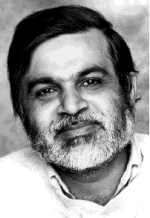
Vassanji was born in
Nairobi, Kenya in 1950 and grew up in Tanzania. His family was
part of a community of Indians who had emigrated to Africa. When
he was 19 Vassanji left the University of Nairobi on a scholarship to
the Massachusetts Institute of Technology. He studied nuclear
physics and earned a Ph.D. in at the University of Pennsylvania.
From there he immigrated to Canada, working at the Chalk River atomic
power station. In 1980 Vassanji moved to Toronto and began writing
his first novel,
The Gunny Sack, (1989) which won the Commonwealth Writers
Prize. After the publication of The Gunny Sack Vassanji ended his
career in nuclear physics and began his writing career.
In his books, Vassanji wrote about the Indian diaspora, beginning with
East Indian immigration to East Africa, and their second migration to
Europe, Canada and USA and about how these migrations affected the
lives and identities of the immigrants.
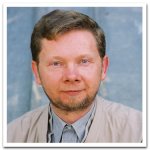
Eckhart Tolle, self-help spiritual teacher and author of million-copy
bestseller "A New Earth: Awakening to your Life's Purpose"
is Canada's most recent celebrity author. He was born in Germany
and immigrated to Vancouver in 1995. Tolle recently received
Ophrah Windrey's endorsement for his book "A New Earth", and will be
teaching a free interactive online course jointly with Ophrah beginning
March 3. Tolle currently lives in Saltspring Island with his
partner Kim Eng.
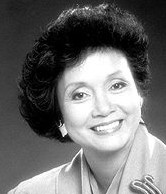
Madame
Clarkson was born in Hongkong and came to Canada as a refugee with
her family, during the war in 1942. She obtained an Honours B.A. and an
M.A. in English Literature from the University of Toronto, did
post-graduate work at the Sorbonne in France and became fluently
bilingual. A leading figure in Canada's cultural life, Madame Clarkson
had a rich and distinguished career in broadcasting, journalism, the
arts and the public service. She was appointed an Officer of the
Order of Canada in 1992, and upon her appointment as the 26th Governor
General of Canada in 1999, she became Chancellor and Principal Companion
of the Order of Canada. Her last novel "Heart Matters" was
published in 2006 is a memoir of her life, and her tenure as governor
general of Canada. The book tells of behind-the-scenes political
intrigues resulting from her attempts to inject prestige and glamour to
the position as gov-general. (photo
on left by Fred Phipps, courtesy, CBC-TV)
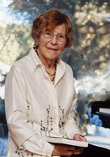
Martha Blum, of Jewish background, and Holocaust survivor was born
in Czernowitz, Austria (now Chernivtsi, Ukraine) in 1913. She studied
Pharmacy in university, and there she met her husband, Richard Blum, a
mathematician, also from Czernowitz. Because of her occupation as
a pharmacist, the Blums were lucky to escape the fate of
concentration camps, and were sent instead, to work as slaves in work
camps. She immigrated to Canada in 1951 and settled in Saskatoon.
There, she found a part time job at a pharmacy, and taught at the
university's college of Pharmacy. In 1999, Martha Blum published
her first novel "The Walnut Tree" at the age of 86,
followed by her second book "The Children of Paper" (2002)
and a third book "The Apothecary" (2006). She
received an honorary doctorate degree from the University of
Saskatchewan in 2006. In 1998, she received the Universal
Declaration of Human Rights Award from Human Rights Canada for her
contributions to the development of cultural life in Canada. She
passed away on Dec. 12, 2007 at the age of 94.
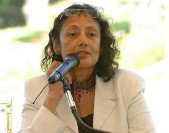 Bharati
Mukherjee was born (1940) in Calcutta to wealthy parents. She
received her B.A. in Calcutta and went to the University of Iowa
to study creative writing. There she met and married Canadian Clark
Blaise (1963). She moved to Canada in 1972, became a citizen, and
lived in Toronto and Montreal for about a decade before moving to the
USA. Her first book "The Tigers Daughter" was
published in 1972. Here she talked about an Indian woman who
returned to India after many years of living in the West, and discovered
how she has changed and now looked at her home country very differently.
Her short story collection "Darkness" published 1985
explores Canadian prejudices and intolerances against South Asians.
She moved to the USA in 1985 where she found better acceptance.
"While changing citizenship is easy, swapping culture is not," said
Mukherjee. "I want to write about others, who for economic, social,
political, or psychological reasons have had to uproot themselves from a
life that was predictable to one where you make up your own rules.
(Quote is from the book Notable Asian American Writers by Helen Zia and
Susan Gall) Bharati
Mukherjee was born (1940) in Calcutta to wealthy parents. She
received her B.A. in Calcutta and went to the University of Iowa
to study creative writing. There she met and married Canadian Clark
Blaise (1963). She moved to Canada in 1972, became a citizen, and
lived in Toronto and Montreal for about a decade before moving to the
USA. Her first book "The Tigers Daughter" was
published in 1972. Here she talked about an Indian woman who
returned to India after many years of living in the West, and discovered
how she has changed and now looked at her home country very differently.
Her short story collection "Darkness" published 1985
explores Canadian prejudices and intolerances against South Asians.
She moved to the USA in 1985 where she found better acceptance.
"While changing citizenship is easy, swapping culture is not," said
Mukherjee. "I want to write about others, who for economic, social,
political, or psychological reasons have had to uproot themselves from a
life that was predictable to one where you make up your own rules.
(Quote is from the book Notable Asian American Writers by Helen Zia and
Susan Gall)

|

|